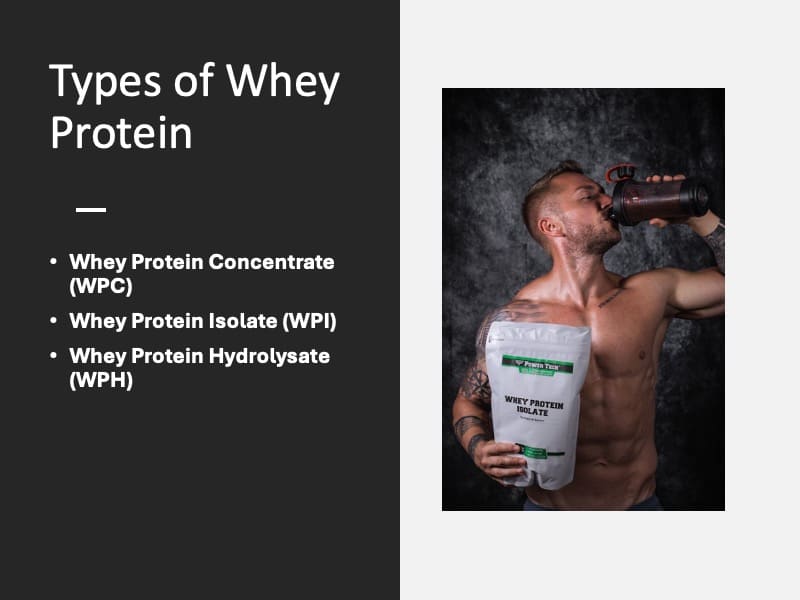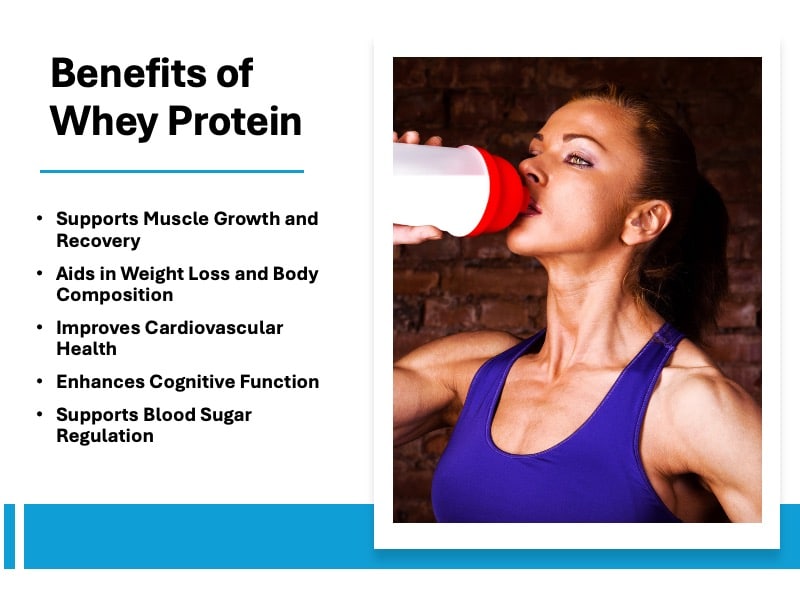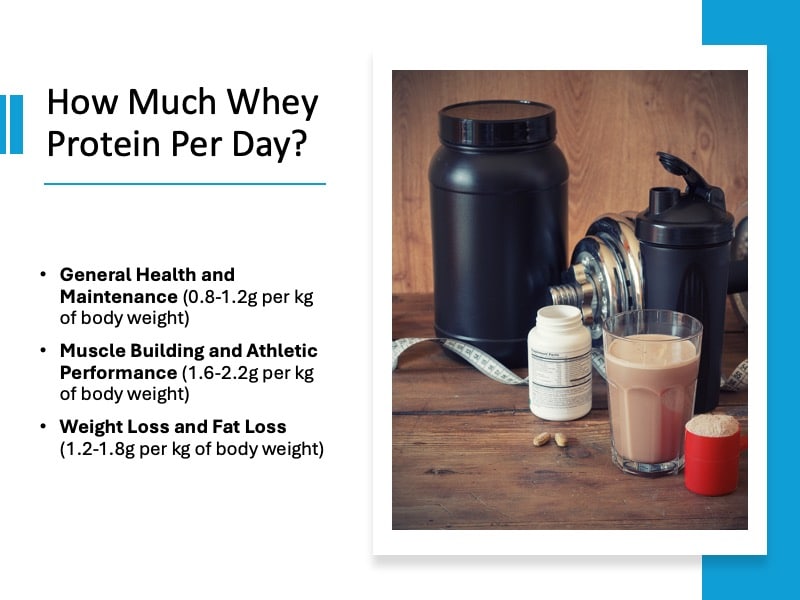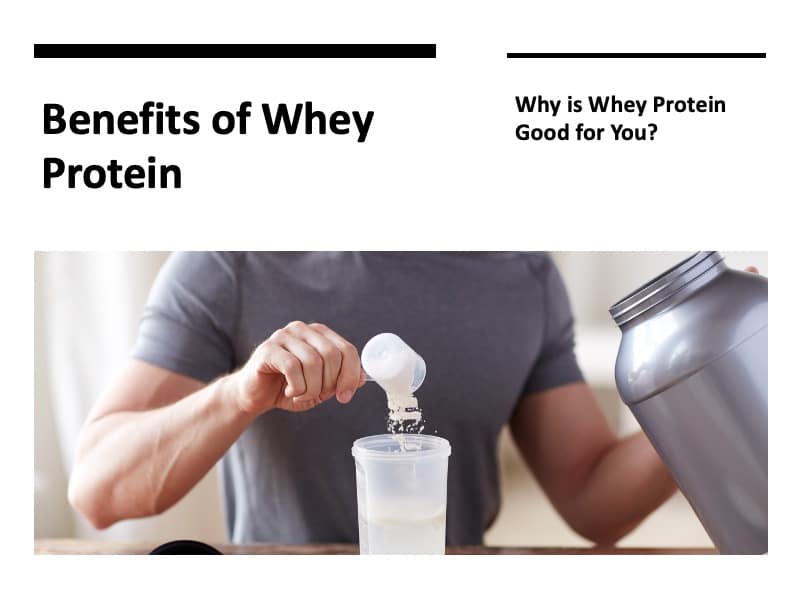Benefits of Whey Protein: Why is Whey Protein Good for You?
Whey protein is one of the most popular and scientifically backed protein supplements, known for its high-quality amino acid profile and rapid absorption, making it an excellent choice for muscle growth, recovery, and overall health.
When it comes to protein supplements, I personally lean toward plant-based protein supplements like Garden of Life Protein & Greens because of their nutrient density, added fiber, and overall digestive ease.
I love the idea of getting protein from a mix of plant sources while also fueling my body with essential vitamins, minerals, and phytonutrients. However, I fully acknowledge that when it comes to muscle-building efficiency, whey protein is king.
Whey protein stands out because it has the most complete amino acid profile, particularly high levels of leucine, which is critical for muscle protein synthesis and recovery.
This makes it an excellent option for athletes, bodybuilders, and anyone looking to optimize muscle growth and repair.
It absorbs quickly, works effectively, and has been extensively studied for its benefits on muscle mass, weight management, and even cognitive function.
That being said, whey protein isn’t for everyone.
Since it comes from dairy, those with lactose intolerance or milk allergies may experience digestive discomfort or adverse reactions.
While whey isolate contains less lactose and may be easier on digestion, some people still prefer to avoid dairy altogether.
So, who is whey protein best for?
- Athletes and gym-goers looking for rapid muscle recovery.
- People aiming to lose fat while maintaining muscle mass.
- Older adults who need extra protein to preserve lean body mass.
- Anyone without dairy sensitivities who wants a convenient, high-quality protein source.
If you’re looking for the best protein powder supplements to maximize strength and muscle growth, whey protein is one of the most scientifically backed options available.
But if you’re more focused on gut health, plant-based nutrition, or avoiding dairy, plant protein powders might be a better fit.
Now, let’s dive into everything you need to know about whey protein—its benefits, risks, types, and how to use it effectively.
What is Whey Protein?
Whey protein is a high-quality, fast-digesting protein derived from milk during the cheese-making process.
It is one of the two main proteins found in dairy (the other being casein) and is highly valued for its complete amino acid profile, making it an excellent source of essential nutrients for muscle growth, recovery, and overall health.
How is Whey Protein Made?
During cheese production, liquid whey separates from the curds and is then processed into whey protein powderthrough various filtration methods.
This results in different forms of whey protein, including concentrate, isolate, and hydrolysate, each offering unique benefits based on their protein content and digestibility.
Due to its high bioavailability, whey protein is widely used by athletes, bodybuilders, and fitness enthusiasts to support muscle repair, boost metabolism, and improve body composition.
However, since it comes from dairy, it may not be suitable for individuals with lactose intolerance or milk allergies.
Types of Whey Protein

There are several types of whey protein, each varying in protein content, processing methods, and digestibility, making it important to choose the right one based on your fitness goals, dietary needs, and tolerance to dairy.
Whey Protein Concentrate (WPC)
Contains 70-80% protein, along with some fats and carbohydrates, making it the most natural and least processed form of whey.
It retains more of the beneficial immune-boosting compounds and bioactive peptides found in whole whey but may not be ideal for those with lactose sensitivity due to its higher lactose content.
Whey Protein Isolate (WPI)
A higher-purity form of whey with over 90% protein, achieved through additional filtration processes that remove most of the fat and lactose.
This makes it an excellent choice for those looking to minimize extra calories or avoid digestive discomfort from lactose while still benefiting from a high-quality protein source.
Whey Protein Hydrolysate (WPH)
A pre-digested form of whey, where proteins are broken down into smaller peptides through enzymatic hydrolysis for faster absorption and easier digestion.
This type is often used in medical settings, infant formulas, and sports nutrition for individuals who require rapid protein uptake, such as post-surgery patients or high-performance athletes.
Benefits of Whey Protein

Whey protein is more than just a muscle-building supplement—it provides a range of health benefits that support overall well-being.
From improving body composition and cardiovascular health to aiding cognitive function and blood sugar regulation, whey protein is one of the most researched and effective supplements available.
By incorporating whey protein into a well-balanced diet, individuals can experience a wide range of health benefits, making it a versatile and powerful addition to a healthy lifestyle.
Supports Muscle Growth and Recovery
Whey protein is a complete protein with a high concentration of branched-chain amino acids (BCAAs), particularly leucine, which plays a critical role in muscle protein synthesis.
This makes it especially beneficial for athletes, weightlifters, and active individuals looking to build muscle, recover faster, and prevent muscle loss.
Research shows that consuming whey protein post-exercise significantly enhances muscle growth and recovery compared to other protein sources (Kim et al., 2023).
Related Reading: Top 25 Muscle-Building Foods
Aids in Weight Loss and Body Composition
Whey protein can support fat loss and lean muscle retention, making it a great tool for weight management.
It promotes satiety, reducing overall calorie intake, while also preserving muscle mass during weight loss.
A meta-analysis found that individuals supplementing with whey protein saw reductions in BMI, waist circumference, and body fat percentage, while simultaneously increasing lean body mass, especially when combined with resistance training (Sepandi et al., 2022).
Related Reading: Is Protein Powder Good for Weight Loss?
Improves Cardiovascular Health
Whey protein may contribute to heart health by lowering triglyceride levels and increasing HDL (good cholesterol), which are key factors in reducing cardiovascular disease risk.
A systematic review found that whey protein supplementation significantly improved lipid profiles, making it beneficial for individuals at risk of high cholesterol, hypertension, or heart disease (Gataa et al., 2025).
Enhances Cognitive Function
Beyond muscle and metabolism, whey protein also benefits brain health.
A 12-month randomized controlled trial showed that whey protein enriched with milk fat globule membrane (MFGM), taurine, and B vitamins significantly improved cognitive performance in older adults with mild cognitive impairment (MCI).
This suggests that whey protein may play a role in supporting brain function and reducing cognitive decline (Li et al., 2025).
Supports Blood Sugar Regulation
Whey protein has been shown to moderate blood sugar spikes and improve insulin sensitivity, making it an excellent supplement for individuals managing diabetes or metabolic disorders.
Research indicates that consuming whey protein before or with a meal lowers postprandial glucose levels, helping to stabilize blood sugar and potentially reducing diabetes-related complications (Patel et al., 2023).
Potential Risks and Side Effects of Whey Protein
While whey protein offers numerous health benefits, it’s important to be aware of potential risks and considerations, especially for individuals with dietary restrictions, pre-existing conditions, or sensitivities to dairy.
Although most people can safely consume whey protein in moderate amounts, excessive intake or improper use may lead to digestive issues, allergic reactions, and potential long-term health effects.
Can Whey Protein Cause Acne?
Whey protein has been linked to acne flare-ups, particularly in individuals with dairy sensitivity. Some studies suggest that excessive intake may contribute to increased sebum production (Cava et al., 2024).
Does Whey Protein Affect Kidney and Liver Health?
While whey protein is safe in moderate amounts, excessive intake may strain kidney function, particularly in those with pre-existing renal conditions. A systematic review found a link between chronic high-protein diets and kidney stress (Vasconcelos et al., 2021).
Does Whey Protein Expire?
Yes, whey protein has an expiration date.
Over time, exposure to moisture and heat can degrade its quality and effectiveness. Always store in a cool, dry place.
Is Whey Protein Dairy and Does It Contain Lactose?
Whey protein is derived from dairy and contains lactose.
However, whey isolate has minimal lactose, making it suitable for those with mild lactose intolerance.
Is Whey Protein Gluten-Free and Vegan?
Whey protein is naturally gluten-free but not vegan, as it comes from milk.
Plant-based alternatives include pea, soy, and rice protein.
How Much Whey Protein Per Day?

The optimal amount of whey protein depends on your individual goals, activity level, and overall protein intake from food sources.
Research suggests that adequate protein intake plays a crucial role in muscle maintenance, recovery, and metabolic health, but excessive consumption may not provide additional benefits and could even lead to digestive discomfort or unnecessary calorie intake.
To maximize benefits, it’s best to distribute protein intake across meals and consume whey protein as part of a balanced diet with whole food protein sources like lean meats, fish, eggs, legumes, and dairy.
General Health and Maintenance (0.8-1.2g per kg of body weight)
For individuals looking to maintain overall health without specific performance goals, the Recommended Dietary Allowance (RDA) for protein is 0.8g per kg of body weight per day (Hruby & Jacques, 2020).
However, studies indicate that slightly higher intakes (up to 1.2g per kg) may be beneficial for older adults to preserve lean muscle mass and prevent age-related muscle loss (sarcopenia) (Deutz et al., 2014).
Muscle Building and Athletic Performance (1.6-2.2g per kg of body weight)
Athletes and individuals focused on muscle growth, strength gains, and enhanced recovery may require higher protein intake to optimize muscle protein synthesis.
Research suggests that consuming 1.6-2.2g per kg of body weight per day leads to significant improvements in lean body mass and muscle repair, especially when combined with resistance training (Morton et al., 2018).
Studies also show that distributing protein intake evenly throughout the day enhances muscle recovery and maximizes absorption (Areta et al., 2013).
Weight Loss and Fat Loss (1.2-1.8g per kg of body weight)
Higher protein intake has been linked to greater fat loss while preserving lean muscle mass during a caloric deficit.
Studies indicate that consuming 1.2-1.8g per kg of body weight per day helps increase satiety, regulate appetite, and boost metabolism, making whey protein an effective tool for weight management (Leidy et al., 2015).
Protein-rich diets have also been shown to reduce cravings and promote greater adherence to calorie-controlled diets, aiding in long-term fat loss success (Pasiakos et al., 2015).
Can You Consume Too Much Whey Protein?
While higher protein intake is generally safe for healthy individuals, excessive consumption (over 3g per kg of body weight daily) may strain kidney function in those with pre-existing kidney disease (Martin et al., 2005).
Additionally, high doses of whey protein without balancing other macronutrients may lead to digestive discomfort, bloating, or nutrient imbalances.
To maximize benefits, it’s best to distribute protein intake across meals and consume whey protein as part of a balanced diet with whole food protein sources like lean meats, fish, eggs, legumes, and dairy.
When to Take Whey Protein?
Choosing when to take whey protein primarily depends on your goals, whether it’s muscle building, recovery, weight management, or general health.
Since whey protein is fast-digesting, it is most effective when consumed at strategic times to maximize protein synthesis and optimize recovery.
Post-Workout (Best for Muscle Growth & Recovery)
- Why? The period 30-60 minutes after exercise (often called the “anabolic window”) is when muscle protein synthesis (MPS) is at its peak. Whey protein is quickly absorbed and rich in leucine, an amino acid essential for stimulating muscle repair and growth (Tang et al., 2009).
- Best for: Strength training, endurance athletes, and those looking to build muscle.
- How? Mix 25-30g of whey protein with water or milk and consume it immediately after your workout for optimal recovery.
Pre-Workout (For Energy & Muscle Preservation)
- Why? Taking whey protein 30-60 minutes before training provides essential amino acids to fuel muscles during exercise, reduce muscle breakdown, and enhance endurance (Tipton et al., 2001).
- Best for: Athletes who need extra protein for muscle preservation during long or intense workouts, but is a useful strategy for the general populations as well.
- How? Consume 20-25g of whey protein with water or a small carbohydrate source (like a banana) for a steady energy supply.
Morning (To Support Muscle Maintenance & Metabolism)
- Why? After 8+ hours of fasting overnight, your body needs protein to kickstart muscle protein synthesis, support metabolism, and reduce muscle breakdown (Khaing et al., 2025).
- Best for: Anyone looking to maintain lean muscle mass and stay full longer in the morning.
- How? Add 25-30g of whey protein to a smoothie, oatmeal, or yogurt for a balanced breakfast.
Between Meals (For Satiety & Weight Management)
- Why? Whey protein helps curb hunger, control cravings, and stabilize blood sugar levels, making it an effective snack option for weight loss or muscle preservation (Leidy et al., 2015).
- Best for: Those on a calorie-controlled diet or looking to increase daily protein intake without adding excessive calories.
- How? Mix 20-25g of whey protein with water or a low-calorie beverage for a filling, protein-rich snack.
Before Bed (For Overnight Muscle Recovery)
- Why? While casein protein is the preferred option for overnight recovery due to its slow digestion, whey protein combined with casein or a meal can still provide muscle support throughout the night (Snijders et al., 2015).
- Best for: Athletes in high-intensity training or those aiming to prevent muscle breakdown overnight.
- How? Consume 30g of whey protein with a healthy dietary fat source (like almond butter) or mix it into Greek yogurt for a slow-release protein boost.
How to Use Whey Protein Effectively
Using whey protein strategically in your diet can enhance recovery, support weight management, and provide essential nutrients in a simple and effective way.
Protein Shakes
- How? Mix 25-30g of whey protein with water or milk and consume to maximize muscle protein synthesis and reduce soreness.
Meal Replacement Smoothies
- Why? Whey protein can be a nutrient-dense meal replacement when combined with whole food ingredients, providing sustained energy and satiety.
- How? Blend one scoop (25-30g) of whey protein with fruits, oats, nut butter, chia seeds, or yogurt to create a balanced, high-protein smoothie that keeps you full longer and supports weight management and muscle maintenance.
Cooking & Baking
- Why? Whey protein is versatile and can be easily incorporated into recipes to increase protein intake without significantly altering taste or texture.
- How? Add one scoop to pancakes, muffins, oatmeal, Greek yogurt, or homemade protein bars for a convenient way to boost daily protein intake. When baking, mix whey protein with moist ingredients like mashed bananas or yogurt to maintain texture and consistency.
Best Whey Protein Supplements
Finding the best whey protein supplement depends on quality, protein content, and individual dietary preferences.
These top-rated options provide a balance of purity, taste, and effectiveness for various fitness and health goals.
Optimum Nutrition Gold Standard 100% Whey Protein
One of the most widely recognized whey protein powders, known for its high quality and affordability. As one of the best protein powders at Walmart and other grocery stores as well, it remains a top choice for athletes and fitness enthusiasts.
Each serving contains 24 grams of protein from a blend of whey protein isolate, concentrate, and peptides, delivering a balanced amino acid profile.
With over five grams of naturally occurring BCAAs, it supports muscle recovery and growth.
The low carbohydrate, fat, and sugar content makes it a great option for those seeking a clean protein source.
Last update on 2025-07-11 / This article includes affiliate links/Images via Amazon Product Advertising API. I may earn commissions on purchases made through these links.
RSP Nutrition TrueFit Gut Healthy Protein Powder
RSP Nutrition TrueFit provides 25 grams of grass-fed whey protein per serving, sourced from humanely raised cows free from added antibiotics and hormones.
Formulated with prebiotics, probiotics, and organic superfoods, it promotes digestive health and gut balance.
Works well as a meal replacement shake, supporting weight management and satiety without artificial sweeteners, soy, or gluten.
Last update on 2025-07-11 / This article includes affiliate links/Images via Amazon Product Advertising API. I may earn commissions on purchases made through these links.
Naked Whey 100% Grass-Fed Whey Protein Powder
Naked Whey ontains only one ingredient: pure whey protein with no additives, sweeteners, or fillers.
Cold-processed to retain naturally occurring nutrients and amino acids, ensuring minimal processing and maximum purity.
Sourced from grass-fed cows, making it a high-quality, clean protein option for those looking for an all-natural supplement.
Last update on 2025-07-11 / This article includes affiliate links/Images via Amazon Product Advertising API. I may earn commissions on purchases made through these links.
BulkSupplements Whey Protein Isolate Powder
BulkSupplements Whey Protein Isolate Powder delivers 30 grams of whey protein isolate per serving, one of the highest protein concentrations available.
Free from artificial flavors, soy, and gluten, making it ideal for those who prefer a simple, additive-free supplement.
Designed for athletes and fitness enthusiasts who need a high-quality protein source without added fillers.
Last update on 2025-07-11 / This article includes affiliate links/Images via Amazon Product Advertising API. I may earn commissions on purchases made through these links.
Nutricost Whey Protein Concentrate
Nutricost Whey Protein Concentrate provides five pounds of whey protein concentrate, offering excellent value for those who purchase in bulk.
Non-GMO and gluten-free with a smooth milk chocolate flavor that mixes easily.
A solid choice for those looking for a cost-effective whey protein option without unnecessary additives.
Each of these whey protein supplements delivers quality nutrition for different dietary needs and fitness goals, making them excellent choices for muscle recovery, weight management, and overall health support.
Last update on 2025-07-11 / This article includes affiliate links/Images via Amazon Product Advertising API. I may earn commissions on purchases made through these links.
Final Thoughts: Is Whey Protein Good for You?
Whey protein is one of the most effective and well-researched protein supplements available, offering a wide range of benefits for muscle growth, recovery, weight management, and overall health.
It provides a complete amino acid profile, is rapidly absorbed, and has been shown to support cardiovascular health, cognitive function, and metabolic balance.
However, whether whey protein is right for you depends on your dietary needs, fitness goals, and tolerance to dairy.
For individuals who can consume dairy without issues, whey protein is an excellent choice for maximizing muscle protein synthesis and enhancing athletic performance.
On the other hand, those with lactose intolerance, dairy allergies, or a preference for plant-based diets may benefit more from vegan protein alternatives like Garden of Life Protein & Greens, which offer added fiber and micronutrients.
When comparing whey vs. plant protein, whey is superior for muscle growth and recovery due to its complete amino acid profile and rapid absorption, while plant protein offers added fiber, micronutrients, and a dairy-free alternative that supports digestion and overall wellness.
Ultimately, whey protein can be a valuable addition to a well-balanced diet, but like any supplement, it should be used strategically and in moderation.
Whether your goal is building muscle, losing fat, or simply increasing protein intake, choosing a high-quality whey protein and incorporating it at the right times can help you achieve optimal results.
This website does not provide medical advice. This website site does contain affiliate links, and purchases may earn a commission.
Read my Medical Disclaimer, Review Disclaimer, and Publishing Policies for more details. Use of this site indicates acceptance of these terms.








